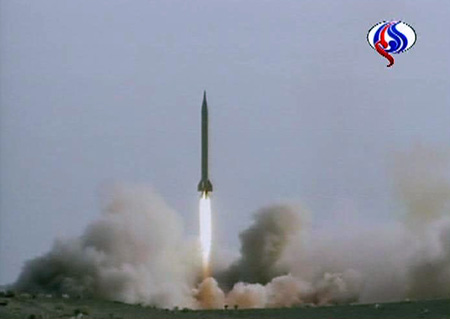Iran has successfully test-fired both medium- and long-range missiles in two consecutive days, in what many analysts described as a move to trigger grave concerns over stability in the region.
By testing a long-range missile capable of reaching targets in Israel as well as U.S. military facilities in the region, Iran has delivered a signal that it is capable of hitting back in case of an Israeli or U.S. attack, analysts say.

A video grab from Al Alam television shows one of nine long- and medium-range missiles being fired during a test in Iran July 9, 2008.[Xinhua/Reuters Photo]
SENSITIVE TIME?
The missile tests came just a day after the United States had signed a defense shield agreement with the Czech Republic, a sensitive time which may spark many speculations on what's Iran's real intention behind the tests.
Washington claimed the installation of a radar base on Czech soil was designed to protect most of its European allies from the threat of long-range missiles fired by "rogue states" such as Iran.
In order to effectively eliminate the Iran threat, the United States is also thrashing out ways to deploy missiles in Poland, which said an agreement with Washington has not been finalized yet.
Iran's missile tests also lend U.S. an excuse of persuading other countries such as Russia the necessity of expanding its missile defense system in Europe.
U.S. Secretary of State Condoleezza Rice vowed after the Iran tests that Tehran should have no doubt about the U.S. commitment to defending its allies from possible attacks.
"We are also sending a message to Iran that we will defend American interests and ... the interests of our allies," she said.
But the defense shield plan has drawn fierce opposition from Russia, which says the U.S. system would undermine both the Europe and Russia's security.
DEFENSE OR COUNTER-ATTACK?
Analysts say the tests are a signal by Iran that the country has the military might to counter any aggression, as the Shahab 3 missile can hit any target within a range of 2,000 km.
However, Iranian Defense Minister Mostafa Mohammad Najjar's comment on the tests was low-key, saying Iran's missile capacity is for defensive purposes and peace safeguarding within the country and in the Persian Gulf region.
"Our missiles will not be used to threaten any country and they are only intended for those who dare attack Iran," he added.
In the military maneuver dubbed Payambar-e-Azam 3 (Great Prophet 3), the Iranian army also test-fired missiles with improved accuracy, such as the Zelzal and Fateh missiles with ranges of 400 km and 170 km respectively.
An aide to Iran's supreme leader Ayatollah Ali Khamenei said Tuesday Iran would strike Tel Aviv and the U.S. fleet in the Gulf as a first response to any attack against the Islamic republic.
IS WAR IMMINENT?
The provocative exchange of words and actions by Washington and Tehran have raised the specter of war, though both sides denied any military action is imminent.
Washington and its allies have accused Iran of trying to develop nuclear weapons under the cover of a civilian nuclear program, which Tehran denied.
Years of bargaining around the table, however, have produced no much positive results despite rounds of harsh sanctions from the United States and Europe.
Despite mounting tensions, some observers hold that negotiations on the Iranian nuclear issue can be resumed.
The Bush administration has said it is committed to seeking a diplomatic solution to the nuclear row though a military action has not been ruled out.
During his last year in the White House, Bush will be hesitant about a military action against Iran since the Iraq war has already dragged him into a quagmire, observers say.
In the Group of Eight summit in Japan, leaders of the major industrialized nations expressed their support of resolving the Iranian nuclear issue through negotiations.
"We firmly support and cooperate with the efforts by Britain, China, France, Germany, Russia and the United States...to resolve the issue innovatively through negotiation," they said.
(Xinhua News Agency July 11, 2008)